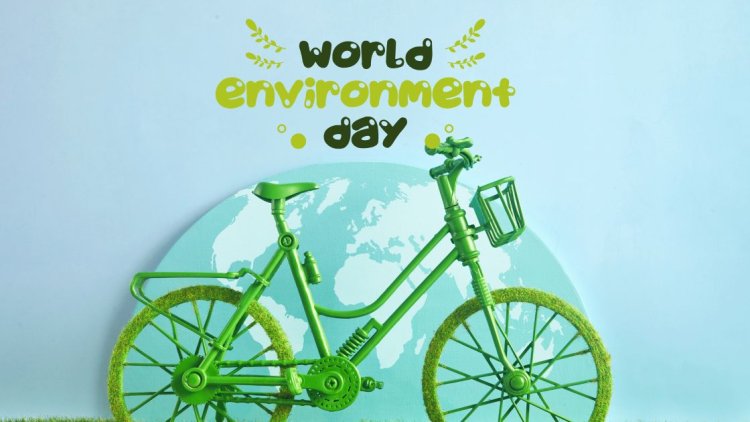World Environment Day 2023 | Driving Towards a Sustainable Future | Solutions to Plastic Pollution
Join us on World Environment Day 2023 as we explore innovative solutions in the automotive industry to tackle plastic pollution. Discover how advancements in materials, recycling technology, and collaborations are driving us towards a sustainable future.

World Environment Day, celebrated annually on June 5th, serves as a global platform for raising awareness and encouraging action towards pressing environmental issues. In 2023, as we commemorate this significant day, the theme "Solutions to Plastic Pollution" takes center stage. Plastic pollution has emerged as one of the most challenging environmental problems of our time, impacting ecosystems, human health, and even the automotive industry. As an automobile news website, we have a unique opportunity to shed light on the issue and explore the innovative solutions driving us towards a sustainable future.
1. The Plastic Problem and its Impact on the Automotive Industry:
Plastic pollution has become a worldwide crisis, with staggering statistics showcasing its detrimental effects on the environment. From the contamination of oceans and waterways to the harm caused to marine life, the consequences are far-reaching. The automotive industry, heavily reliant on plastics for manufacturing various components, has also been affected. However, it is crucial to acknowledge that the industry is actively striving to combat this issue.
2. Innovation in Automotive Materials:
Recognizing the need for sustainable alternatives, automotive manufacturers are embracing innovation and incorporating environmentally friendly materials. Bio-based and biodegradable plastics are being explored as substitutes for traditional petroleum-based plastics. These eco-friendly materials, derived from renewable resources, reduce the carbon footprint and mitigate the negative impact on the environment.
3. Advancements in Recycling Technology:
Efficient recycling plays a vital role in reducing plastic pollution. Automotive companies are investing in advanced recycling technologies to tackle the issue effectively. The recycling of plastics from end-of-life vehicles (ELVs) is being improved, ensuring that these materials are repurposed rather than ending up in landfills or polluting ecosystems. Through initiatives such as extended producer responsibility (EPR) and improved waste management systems, the automotive industry is actively participating in the circular economy.
4. Collaborations and Partnerships:
Addressing plastic pollution requires a collective effort. The automotive industry is collaborating with various stakeholders, including governments, NGOs, and research institutions, to find sustainable solutions. Partnerships focused on research and development, policy advocacy, and consumer education are being forged to create a comprehensive approach towards combating plastic pollution.
5. Consumer Awareness and Education:
Raising awareness among consumers about the impact of plastic pollution is essential for fostering behavioral change. As an automobile news website, we have a responsibility to educate our audience about the importance of responsible consumption and disposal of plastic products. Promoting eco-conscious choices such as opting for reusable automotive accessories and reducing single-use plastics in vehicles can significantly contribute to combating the plastic problem.
As we celebrate World Environment Day, the need for sustainable practices and environmental awareness has never been more critical. One area where significant progress is being made is in the adoption of electric vehicles (EVs). These vehicles offer a promising solution to reduce greenhouse gas emissions, combat air pollution, and mitigate the impact of fossil fuel consumption on our planet.
EVs are powered by electricity, either from batteries or fuel cells, and produce zero tailpipe emissions. By transitioning from conventional gasoline-powered cars to EVs, we can significantly reduce air pollution, which has adverse effects on human health and contributes to climate change. The combustion of fossil fuels in traditional vehicles releases harmful pollutants, including carbon dioxide, nitrogen oxides, and particulate matter. EVs, on the other hand, produce zero direct emissions, resulting in cleaner air and improved respiratory health for both urban and rural areas.
Furthermore, EVs play a crucial role in reducing greenhouse gas emissions, a major contributor to climate change. As the electricity generation sector continues to shift towards renewable energy sources such as solar and wind power, charging EVs with clean energy becomes increasingly viable. This transition from fossil fuels to renewable energy for powering EVs significantly decreases the carbon footprint associated with transportation.
In addition to their environmental benefits, EVs also offer economic advantages and energy independence. With the rising costs of fossil fuels and the declining prices of electric vehicle technologies, EVs are becoming more affordable and cost-effective for consumers. Moreover, as renewable energy infrastructure expands, individuals can charge their EVs at home or at public charging stations, reducing their dependence on fossil fuel imports and promoting energy independence.
However, despite the numerous benefits of EVs, there are still challenges to overcome. The availability and accessibility of charging infrastructure remain crucial for widespread adoption. Governments, businesses, and individuals must work together to invest in charging stations and develop a robust network that ensures convenient and reliable charging options for EV users. Additionally, continued advancements in battery technology, such as increased range and faster charging capabilities, will further enhance the appeal and practicality of EVs.
World Environment Day 2023 serves as a reminder of the urgent need to raise awareness about EVs and their role in building a sustainable future. Through education and outreach, we can empower individuals to make informed choices and embrace the benefits of EVs. Governments can provide incentives and supportive policies to accelerate the adoption of EVs, including tax credits, rebates, and infrastructure development. Businesses can contribute by incorporating electric vehicles into their fleets and promoting sustainable transportation options for employees.












